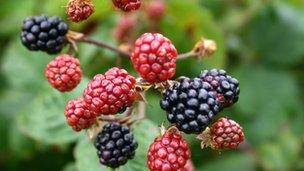Late autumn 'to bring bumper fruit crop' for wildlife
- Published

A late autumn is set to bring a bumper crop of fruits and berries for wildlife in the UK countryside, experts say.
Fruiting is expected to be delayed after a late spring but the recent warm weather should see flourishing berry crops, according to the Woodland Trust.
The predictions are based on data recorded by trust volunteers for its Nature's Calendar project.
Wildlife suffered last year after a wet summer resulted in exceptionally poor crops of fruit from trees and shrubs.
The trust said that last year 14 out of the 16 species of trees and shrubs collected since 2001 saw their worst season for fruiting since the turn of the century.
Beech, holly and brambles or blackberries were among those recording only meagre crops.
Birds and mammals were also hit by a cold snap this spring.
After summer 2012 had been the second-wettest on record, spring this year was the coldest since 1962.
'Autumn feast'
Dr Kate Lewthwaite, the Nature's Calendar project manager, said: "Although our records suggest that autumn fruiting will be late this year due to the delayed onset of spring flowering, if the warm weather interspersed with occasional wet spells continues, this should mean the fruiting of shrubs like bramble, rowan and blackthorn is abundant.
"Wildlife species will no doubt benefit from a bumper crop, and finally fruit-eating birds and mammals will be able to enjoy an autumn feast."
The Nature's Calendar project contains records dating back to the 17th Century.
Volunteers record the signs of the seasons in their areas, helping scientists understand how wildlife is adapting to the changing environment. But the numbers participating have been falling and the Woodland Trust is appealing for more contributors.
- Published22 May 2013
- Published23 August 2012
- Published12 June 2013
- Published3 May 2012
- Published28 July 2013